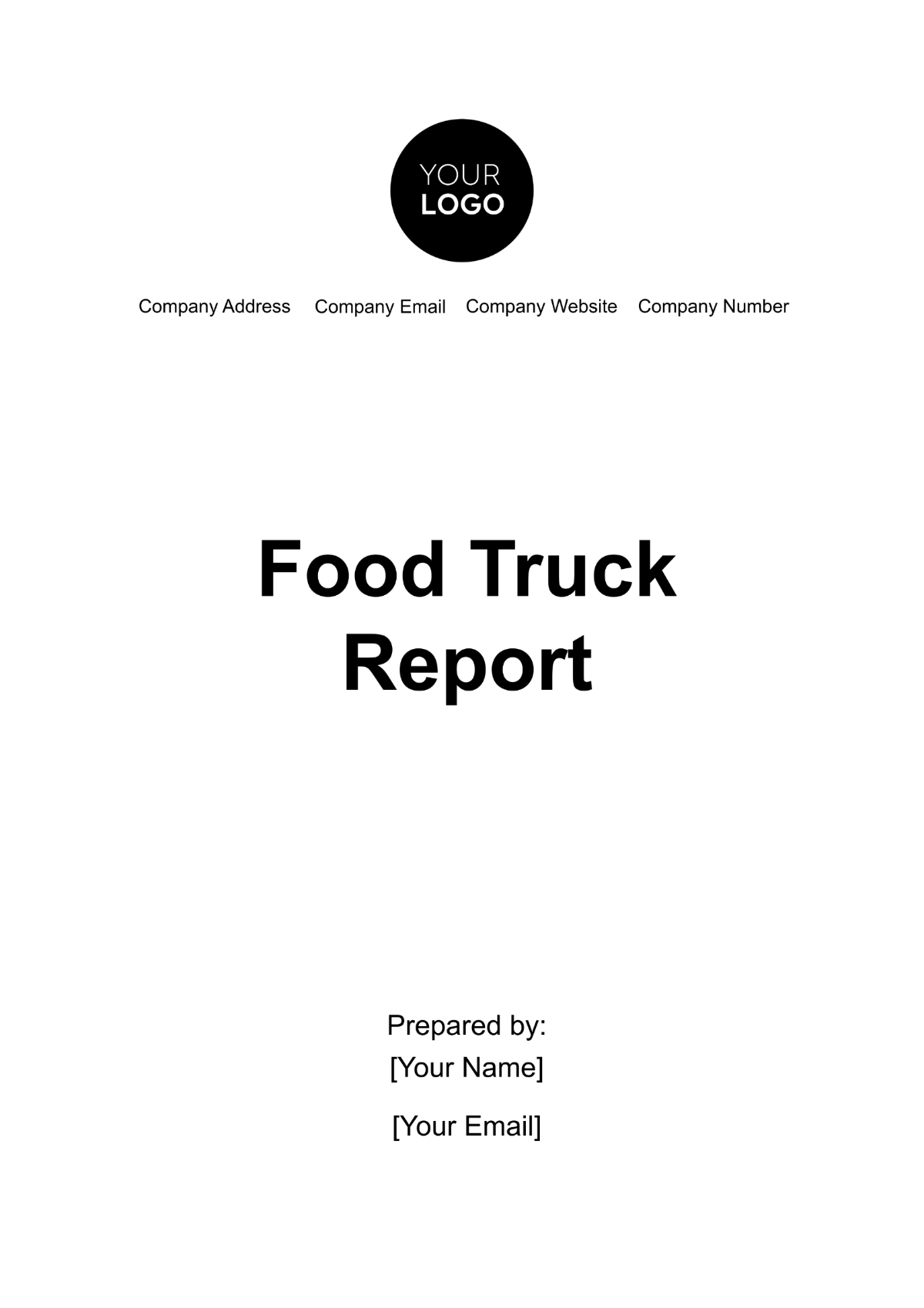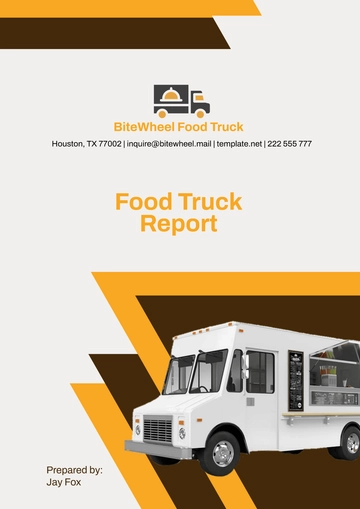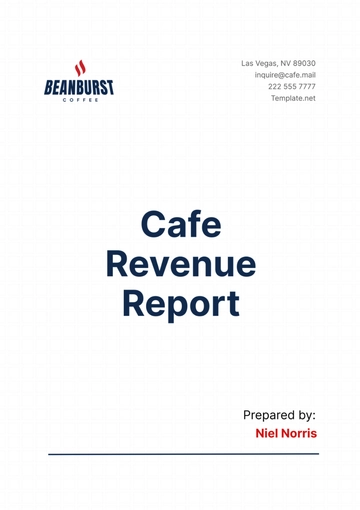Free Food Truck Report

I. Introduction
The food truck industry has witnessed substantial growth over the past decade, evolving from a niche market into a significant segment of the food service industry. With an increasing number of consumers seeking convenient dining options that offer diverse culinary experiences, food trucks have become a popular choice in urban areas across the United States. According to industry reports, the market size of food trucks has expanded dramatically, with projections suggesting continued growth driven by consumer demand for gourmet street food and mobile dining experiences. Additionally, food trucks have embraced technology, leveraging online ordering and social media to reach broader audiences and enhance customer engagement.
Despite the promising growth, food truck operators face various operational challenges that can impact their success. Regulatory compliance, such as obtaining the necessary permits and licenses, remains a critical hurdle for many entrepreneurs. Additionally, competition is intensifying as new food trucks enter the market, necessitating differentiation through unique offerings and exceptional customer service. This report will delve into current market trends, including popular cuisines and locations, analyze the operational challenges faced by food truck owners, and present future projections to offer valuable insights for stakeholders in the food truck industry. As we explore these facets, [Your Company Name] aims to equip operators with the knowledge needed to thrive in this dynamic market.
II. Market Trends
As the food truck industry continues to evolve, it is crucial to recognize the prevailing market trends that shape consumer preferences and operational strategies. This section highlights two primary components: popular cuisine types and customer demographics. Understanding these trends not only helps food truck operators tailor their menus to meet consumer demands but also assists in identifying target markets effectively. By analyzing the types of cuisine that resonate most with customers and the demographic profiles of food truck patrons, [Your Company Name] aims to provide actionable insights that can drive business growth and enhance customer satisfaction in this competitive landscape.
1. Popular Cuisine Types
Food trucks offer a variety of foods, reflecting diverse culinary traditions. The most popular types of cuisine served by food trucks include:
Mexican/Latin American
American Comfort Food
Asian Fusion
BBQ
Vegetarian/Vegan
2. Customer Demographics
Understanding the demographics of food truck customers is essential for success. The key demographics include:
Young professionals aged 25-34
Office workers seeking quick lunch options
Event attendees
Food enthusiasts and tourists
III. Operational Challenges
Navigating the operational landscape of the food truck industry presents unique challenges that can significantly impact business success. This section focuses on two critical areas: licensing and regulations, and competition. Food truck operators must be well-versed in the various local laws and requirements that govern their operations, ensuring compliance to avoid penalties. Additionally, as the market becomes more saturated, competition intensifies, compelling food trucks to differentiate themselves through innovative offerings and superior service. By addressing these operational challenges, [Your Company Name] aims to provide food truck owners with strategies to thrive in a competitive environment while maintaining compliance with regulatory standards.
1. Licensing and Regulations
Operating a food truck requires compliance with various local laws and regulations, which can vary significantly from one location to another. Key regulatory challenges include:
Requirement | Description |
|---|---|
Health Permits | Food trucks must obtain health permits to ensure food safety standards are met. |
Zoning Laws | Restrictions on where food trucks can park and serve customers. |
Business Licenses | Compliance with local business licensing requirements. |
2. Competition
The growing popularity of food trucks has led to increased competition. Strategies to stay competitive include:
Innovative and high-quality menu offerings
Outstanding customer service
Effective marketing and social media presence
Participation in food truck festivals and events
IV. Future Projections
The food truck industry stands on the brink of continued evolution and expansion, driven by shifting consumer preferences and technological innovations. This section outlines key future projections related to market growth and advancements that are set to reshape the operational landscape. As convenience and variety remain paramount in consumer dining choices, the food truck market is expected to thrive. Additionally, technological advancements will play a crucial role in enhancing operational efficiency and customer engagement. By exploring these future trends, [Your Company Name] aims to prepare food truck operators for the opportunities and challenges that lie ahead in this dynamic sector.
1. Market Growth
The food truck market is expected to continue its growth trajectory due to several factors, including the convenience of mobile food services and the ongoing consumer interest in diverse and innovative food options.
2. Technological Advancements
Technological advancements are poised to impact the food truck industry. Future trends may include:
Online ordering and payment systems
GPS-based location tracking for customers
Data analytics for better inventory management
Enhanced social media marketing strategies
V. Conclusion
The remarkable resilience and adaptability of food trucks have established them as a vibrant segment within the broader food service market. As highlighted in this report, the increasing demand for convenient dining options and a diverse array of culinary offerings have fueled significant growth in this sector. However, achieving success requires operators to navigate various challenges, such as regulatory compliance and intensifying competition. By understanding current market trends and demographics, food truck owners can tailor their offerings to better meet customer expectations and build a loyal customer base.
Looking ahead, the future of food trucks appears promising, with sustained market growth and the integration of technological advancements set to enhance operational capabilities. Innovations like online ordering systems, GPS tracking, and data analytics will empower food truck operators to optimize their services and engage more effectively with customers. As the industry continues to evolve, [Your Company Name] remains dedicated to equipping food truck operators with the insights and tools necessary to thrive in this dynamic environment. By embracing innovation and staying attuned to consumer preferences, food truck owners can successfully navigate the challenges ahead and capitalize on the abundant opportunities that lie in the future.
- 100% Customizable, free editor
- Access 1 Million+ Templates, photo’s & graphics
- Download or share as a template
- Click and replace photos, graphics, text, backgrounds
- Resize, crop, AI write & more
- Access advanced editor
Monitor business performance with the Food Truck Report Template from Template.net. This editable and customizable document allows you to track sales, customer feedback, and operational insights. Fully editable in our Ai Editor Tool, it ensures accurate reporting and helps drive informed decisions for your food truck's success.
You may also like
- Sales Report
- Daily Report
- Project Report
- Business Report
- Weekly Report
- Incident Report
- Annual Report
- Report Layout
- Report Design
- Progress Report
- Marketing Report
- Company Report
- Monthly Report
- Audit Report
- Status Report
- School Report
- Reports Hr
- Management Report
- Project Status Report
- Handover Report
- Health And Safety Report
- Restaurant Report
- Construction Report
- Research Report
- Evaluation Report
- Investigation Report
- Employee Report
- Advertising Report
- Weekly Status Report
- Project Management Report
- Finance Report
- Service Report
- Technical Report
- Meeting Report
- Quarterly Report
- Inspection Report
- Medical Report
- Test Report
- Summary Report
- Inventory Report
- Valuation Report
- Operations Report
- Payroll Report
- Training Report
- Job Report
- Case Report
- Performance Report
- Board Report
- Internal Audit Report
- Student Report
- Monthly Management Report
- Small Business Report
- Accident Report
- Call Center Report
- Activity Report
- IT and Software Report
- Internship Report
- Visit Report
- Product Report
- Book Report
- Property Report
- Recruitment Report
- University Report
- Event Report
- SEO Report
- Conference Report
- Narrative Report
- Nursing Home Report
- Preschool Report
- Call Report
- Customer Report
- Employee Incident Report
- Accomplishment Report
- Social Media Report
- Work From Home Report
- Security Report
- Damage Report
- Quality Report
- Internal Report
- Nurse Report
- Real Estate Report
- Hotel Report
- Equipment Report
- Credit Report
- Field Report
- Non Profit Report
- Maintenance Report
- News Report
- Survey Report
- Executive Report
- Law Firm Report
- Advertising Agency Report
- Interior Design Report
- Travel Agency Report
- Stock Report
- Salon Report
- Bug Report
- Workplace Report
- Action Report
- Investor Report
- Cleaning Services Report
- Consulting Report
- Freelancer Report
- Site Visit Report
- Trip Report
- Classroom Observation Report
- Vehicle Report
- Final Report
- Software Report










